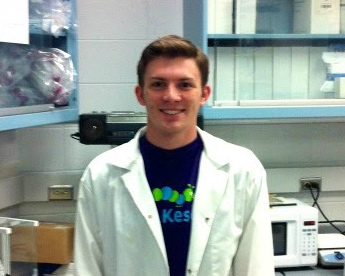
David Reed
Vaccine development is incredibly important in the field of cancer research. These innovative new treatments hold great potential for preventing and slowing cancer. Mark Suckow, DVM, director of the Freimann Life Sciences Center and associate research professor of biological sciences, studies the effectiveness of tissue vaccines. These vaccines are harvested from tumor tissue and try to prevent cancer and reduce metastasis. This field is especially interesting for David Reed, an undergraduate student working in Dr. Suckow’s lab this semester.
Reed is a junior majoring in sciencepreprofessional studies with a minor in anthropology. Since his freshman year, Reed has worked with Camp Kesem, a student-run club that operates a one-week summer camp for children whose parents have been affected by cancer. This club “has given me exposure to both the hardships that cancer can inflict upon a family, but also the amazing amount of good that can be done for individuals and their families that are struggling with this disease. My involvement with Kesem has strengthened my desire and dedication to the research that Dr. Suckow is doing,” Reed says. Being involved in this club helps Reed see the people his research can potentially help.
Currently, Reed is assisting with a research study looking at adjuvants (things that make a vaccine more potent) that, in combination with tissue vaccines, could enhance the body’s immune response. If the immune response is strengthened, there is a greater chance the body will be able to fight off existing cancer.
What is the next step after defining his project? Reed needs to test the vaccines thoroughly to determine the effects of various adjuvants. For this experiment, he is using mice that will develop a form of prostate cancer. By testing more than one adjuvant, Reed will be able to see how effective each one is in inhibiting the progress of cancer. Since using tissue vaccines to treat cancer is a newer method, testing is an important next step in making this treatment option viable.
Through his research, Reed is directly contributing to innovative new cancer treatments that are greatly needed. He is excited not only to gain new and valuable research skills, but to be able to contribute to a project that will hold real importance in the cancer research field. Working in a lab and learning in a hands-on way is a great supplement to the rigorous coursework Reed takes during his program. “I am very lucky to be working on something that I care a lot about and hopefully I can help move current research on cancer treatments forward, if only in a small way,” Reed says.
Originally published by at harpercancer.nd.edu on January 15, 2015.
